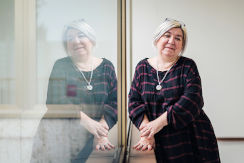Ask an activist: How should women’s rights activists follow up with the Beijing+25 Regional Review Meeting?
Date:
About the author

Natasha Dokovska Spirovska has been a journalist for more than 30 years in North Macedonia. In the last 10 years she has also worked as a civil society activist for gender equality and women’s rights. She has represented Journalists for Human Rights, a non-governmental organization from North Macedonia during the Civil Society Forum and Beijing+25 Regional Review Meeting in Geneva, which took place from 28-30 October 2019.
“Twenty-five years ago, I was part of the Fourth World Conference on Women in Beijing, China. All of us were full of energy and enthusiasm for advancing women’s rights and gender equality. Today, lots of things still have not changed when it comes to women’s lives and gender equality.
Now, 25 years after Beijing, we, as women, need to move forward. After the Beijing+25 Regional Review Meeting in Geneva [for the UN Economic Commission for Europe (UNECE) region], we have new perspectives and new emerging areas of work for women’s rights, such as LGBTIQ rights, women migrant’s rights, the presence of women in the peace and security sector, and cyberbullying against women. These are the new areas where we need to focus our attention in the next five years.
We cannot forget about gender-based violence, which is still an issue of pandemic level in North Macedonia and across the region. The Council of Europe Convention on preventing and combating violence against women and domestic violence [also known as the Istanbul Convention] is one of the tools we can work with and implement. The next key step would be to have more institutional frameworks for our work. Because we, as non-governmental organizations, can initiate some discussions, but if we don’t have the needed institutional support mechanisms, we are limited. We need better cooperation with the governmental institutions, to support each other, and for them to accept us as a partner in fully achieving women’s rights and gender equality.
Each generation of women’s rights activists should never forget that we can only make changes collectively. If we work together and in solidarity, it will be much better for everyone. This is what Generation Equality means!”